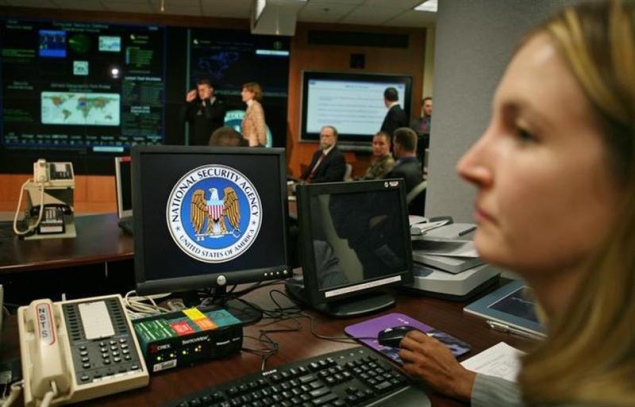- Home
- Internet
- Internet News
- White House confirms single 'dual hatted' leader for NSA, Cyber Command
White House confirms single 'dual-hatted' leader for NSA, Cyber Command

The White House had considered splitting up the two agencies, possibly giving the NSA a civilian leader for the first time in its 61-year history to dampen controversy over its programs revealed by former contractor Edward Snowden.
Both the NSA and Cyber Command, which conducts cyber warfare, are now headed by the same man, Army General Keith Alexander, who is retiring in March. Given that the chief of Cyber Command must be a military officer, the White House decision means that Alexander's successor will be from the military as well.
"Following a thorough interagency review, the administration has decided that keeping the positions of NSA Director and Cyber Command Commander together as one, dual-hatted position is the most effective approach to accomplishing both agencies' missions," said Caitlin Hayden, spokeswoman for the White House's National Security Council.
"Without the dual-hat arrangement, elaborate procedures would have to be put in place to ensure that effective coordination continued and avoid creating duplicative capabilities in each organization."
The White House announced that Obama had received an outside panel's recommendations on what constraints might be in order for the NSA and that the 40 recommendations would be reviewed.
"We expect our overall internal review to be completed in January and the president thereafter to deliver remarks to outline the outcomes of our work," Hayden said.
The review was driven by public disclosures about NSA spying, including reports that German Chancellor Angela Merkel's phone had been monitored.
(Also see: Merkel-tapping allegations prompt Germany to send intelligence chiefs to US)
Based in Fort Meade, Maryland, Cyber Command tries to detect and stop computer penetration of military and other critical networks by U.S. adversaries like China, Iran and North Korea.
However, there is an increasing focus on offense as military commanders beef up plans to execute cyber strikes.
A steady drip of revelations from Snowden about the vast scope of NSA spying has raised widespread concern about the reach of such U.S. operations, with its ability to pry into the affairs of private individuals as well as the communications of foreign leaders.
Review of spying
Obama said last week he intended to propose NSA reforms to reassure Americans that the agency was not violating their privacy.
"I'll be proposing some self-restraint on the NSA and to initiate some reforms that can give people more confidence," Obama said in a television interview on December 5.
(Also see: Obama says NSA isn't interested in reading people's emails and text messages)
The Wall Street Journal reported late on Thursday that the outside panel's draft proposals call for changing the NSA leadership from military to civilian as well as storing the vast amount of data on phone calls collected by the agency at a third-party organization.
The proposals also recommend stricter standards for searching the data amassed by the NSA, the Journal said.
The recommendations from panel, called the Review Group on Intelligence and Communications Technologies, are among several measures suggested this year by Obama, who has said he ordered a review of the surveillance programs before Snowden leaked secret documents to media.
Hayden declined comment "on a report that is not yet final and hasn't yet been submitted to the White House." He said the administration was still working out the details of how and when it will be made public.
© Thomson Reuters 2013
For the latest tech news and reviews, follow Gadgets 360 on X, Facebook, WhatsApp, Threads and Google News. For the latest videos on gadgets and tech, subscribe to our YouTube channel. If you want to know everything about top influencers, follow our in-house Who'sThat360 on Instagram and YouTube.
Related Stories
- Samsung Galaxy Unpacked 2025
- ChatGPT
- Redmi Note 14 Pro+
- iPhone 16
- Apple Vision Pro
- Oneplus 12
- OnePlus Nord CE 3 Lite 5G
- iPhone 13
- Xiaomi 14 Pro
- Oppo Find N3
- Tecno Spark Go (2023)
- Realme V30
- Best Phones Under 25000
- Samsung Galaxy S24 Series
- Cryptocurrency
- iQoo 12
- Samsung Galaxy S24 Ultra
- Giottus
- Samsung Galaxy Z Flip 5
- Apple 'Scary Fast'
- Housefull 5
- GoPro Hero 12 Black Review
- Invincible Season 2
- JioGlass
- HD Ready TV
- Laptop Under 50000
- Smartwatch Under 10000
- Latest Mobile Phones
- Compare Phones
- Vivo Y300i
- Realme 14 5G
- Poco F7 Ultra
- Poco F7 Pro
- Samsung Galaxy M05
- Vivo Y39 5G
- Samsung Galaxy M06 5G
- Samsung Galaxy M16 5G
- Acer TravelLite (2025)
- Asus Zenbook 14 (2025)
- Honor Pad X9a
- Lenovo Idea Tab Pro
- boAt Storm Infinity
- Itel Unicorn Max
- Haier M95E
- Sony 65 Inches Ultra HD (4K) LED Smart TV (KD-65X74L)
- Sony PlayStation 5 Pro
- Sony PlayStation 5 Slim Digital Edition
- Blue Star 1.5 Ton 3 Star Inverter Split AC (IC318DNUHC)
- Blue Star 1.5 Ton 3 Star Inverter Split AC (IA318VKU)

















